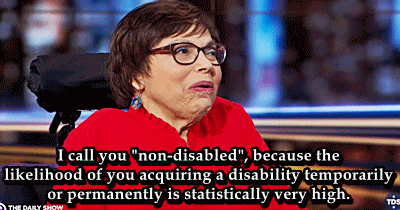#judith heumann
Explore tagged Tumblr posts
Text
We've lost a major, major disability rights and human rights activist. Rest in power, Judith.
271 notes
·
View notes
Text
When someone ignores you, it's an intentional display of power. They're essentially acting like you don't exist, and they do it because they can. They believe that nothing will happen to them; ignoring silenced people. It intentionally avoids resolution or compromise. It ignites your worst fears of unworthiness because it makes you feel that you deserve to be ignored. Inevitably, being ignored puts you in the position of having to choose between making a fuss or accepting the silent treatment. If you stand up to the ignorer and get in their face, you break the norms of polite behavior and end up feeling worse, diminished, demeaned.
— Being Huemann: An Unrepentant Memoir of a Disability Rights Activist by Judith Huemann
10 notes
·
View notes
Link
"Known as the 'mother of the disability rights movement,' Heumann became an internationally recognized leader for her instrumental work pushing for historic legislation…"
55 notes
·
View notes
Text
May her memory be a blessing.
Note: Heumann was Jewish, which means that “rest in peace” is not the respectful way to mourn/recognize her passing.
71 notes
·
View notes
Text

She just wanted to make things better for everyone, her brother said.
She was called a “true force of nature”, a “rolling warrior” who never gave up, continuously fighting for what she believed in and inspiring everyone around her.
When she died this past week on March 4 at the age of 75, she was remembered as a major American civil rights hero.
She “was born in 1947 [in Philadelphia] to two parents who had separately fled Nazi Germany as children in the 1930s,” according to Philissa Cramer, writing for JTA. “All of her grandparents and countless other family members were murdered in the Holocaust.”
At the age of 18 months, she contracted polio, an infection so severe, she spent several months in an iron lung and lost her ability to walk, according to her brother.
She said she believed it was her parents’ experience that led them to reject doctors’ advice to have their daughter institutionalized after she lost the use of her legs, according to Cramer.
“They came from a country where families got separated, some children sent away, others taken from their families by the authorities and never returned — all part of a campaign of systematic dehumanization and murder,” she wrote in her memoir.
“The experience of fleeing Nazi Germany left the parents and their children with a passion.,” according to the Los Angeles Times.
“We truly believe,” her brother would say "that discrimination is wrong in any way, shape or form."
Susan Mizner, Director of the Disability Rights Program and Kendall Ciesemier, Host of At Liberty and Senior Executive Producer of Multimedia, American Civil Liberties Union, wrote:
“When [she] was born, the fight for civil rights didn’t include people with disabilities. Disabled people faced rampant discrimination and segregation in American life. Disabled people experienced high rates of unemployment and were taught in separate schools. Changing these institutions wasn’t just a calling for [her], it was a necessity. At a young age, [she] learned that the world did not see her the way she saw herself, and she spent the rest of her life committed to changing that.”
“The first time that I really remember someone making me feel different was when I was about eight years old,” she told April Coughlin in Story Corps. “My friend and I were going to the candy store. She was pushing my wheelchair, and this young boy came over to me and said, ‘Are you sick?’
“I wished the ground would open and swallow me up. It made me realize that people saw me differently than I saw myself.
~~~~~
NPR correspondent Joseph Shapiro wrote:
“When she was 5 and it was time to go to kindergarten, her parents . . . went to register her but were turned away at the nearby public school.
“It would create a fire hazard, the principal said, to let a girl in a wheelchair go to the school.
“Her mother . . . fought to end the isolating and erratic hours — just a few hours a week — of home instruction and eventually [she] was allowed into a school building.”
“Kids with disabilities were considered a hardship, economically and socially," she would later write.
She spent the rest of her life fighting, first to get access for herself and then for others, her brother recalled.
“Years later, [she] graduated from college where she studied to become a teacher. Being a speech therapist was one of the few professions, she was told, open to a young woman in a wheelchair,” continued Shapiro.
“But again, she was deemed a fire hazard. This time, in 1970, New York City's Board of Education ruled that a teacher in a wheelchair would be unable to evacuate children during an emergency and denied her a teaching license.
“Having learned from her mother's advocacy, [she] sued. She got support in the local press. "You Can Be President, Not Teacher, with Polio," ran one newspaper story, noting the presidency of Franklin Roosevelt.”
She said she wanted to see “feisty disabled people change the world”.
She did.
She “broke down barriers for disabled children and educators in New York City schools, protested until federal legislation protecting people with disabilities was passed and advised multiple presidential administrations on disability issues,” wrote Cramer.
Her tireless advocacy led to her being widely considered "the mother of the disability rights movement," the American Association of People with Disabilities wrote in a press release.
Her name is Judith Heumann.
This is a new story for the Jon S. Randal Peace Page. The Peace Page focuses on past and present stories seldom told of lives forgotten, ignored, or dismissed. The stories are gathered from writers, journalists, and historians to share awareness and foster understanding, to bring people together. And, as such, the stories this month for Women’s History Month are never relegated to one single month - they are available all year in the Peace Page archives and on this page each week throughout the year. We encourage you to learn more about the individuals and events mentioned here and to support the writers, educators, and historians whose words we present. Thank you for being here and helping us share awareness.
~~~~~
“Women have been making history for centuries; for some, this was the only choice they had. For women with disabilities in particular, it was either live the way others expected them to or fight for the lives they knew they (and all people with disabilities) deserved,” according to Melissa Young.
Judith Heumann “was perhaps most recognized in recent years from her appearance in the documentary ‘Crip Camp: A Disability Revolution’, which chronicled the forgotten history of a freewheeling summer camp called Camp Jened in upstate New York for teenagers with disabilities in the 1970s,” wrote Edwin Rios of The Guardian.
“Her experience at Camp Jened inspired a groundswell of US political activism and sparked a movement of young activists with disabilities who fought for civil rights protections at a time when they were treated like second-class citizens.”
She also wrote “Being Heumann: An Unrepentant Memoir of a Disability Rights Activist” and “Rolling Warrior: The Incredible, Sometimes Awkward, True Story of a Rebel Girl on Wheels Who Helped Spark a Revolution.”
Brian P.D. Hannon and Heather Hollingsworth of the Los Angeles Times wrote:
“She lobbied for legislation that eventually led to the federal Americans With Disabilities Act [and the] Individuals With Disabilities Education Act.
“Heumann also was involved in passage of the United Nations Convention on the Rights of Persons With Disabilities, which was ratified in May 2008.
She helped found the Berkeley Center for Independent Living, the Independent Living Movement and the World Institute on Disability and served on the boards of several related organizations, including the American Assn. of People With Disabilities, the Disability Rights Education and Defense Fund, Humanity and Inclusion and the United States International Council on Disability, according to her website.
“Judy pushed the international human rights community to focus on issues facing people with disabilities when confronting the world’s challenges — whether it be war, climate change, pandemics, poverty or anything else. She ensured that disability was included in the Country Reports on Human Rights Practices and was the first disabled person to serve on the board of Human Rights Watch,” wrote Rebecca Cokley, program officer for the US Disability Rights program at the Ford Foundation and co-founder and director of the Disability Justice initiative at the Center for American Progress.
“Along with 80 activists, and with a little help from the Black Panthers, Heumann staged a sit-in for 25 days, the longest sit-in at a federal building to date,” according to writer Lester Fabian Brathwaite. “As a result, regulations were passed enforcing the Rehabilitation Act.”
“It also served as a demonstrable show of force by a community previously framed by society and the media as weak, incapable and dependent. They were anything but that,” wrote Cokley.
“She would later serve as an advisor on disability rights to the Clinton administration, the World Bank, and the Obama administration,” added Brathwaite.
~~~~~
In NPR’s article:
Shantha Rau Barriga, disability rights director at Human Rights Watch, said in a statement Heumman was a “true force of nature”.
“She was a giant in the human rights movement and led with such integrity,” she added. “This loss will be felt far and wide but what a legacy she leaves behind.”
“Beyond all of the policy-making and legal battles that she helped win and fight, she really helped make it possible for disability to not be a bad thing, to make it OK to be disabled in the world and not be regarded as a person who needs to be in a separate, special place,” the president and CEO of the American Association of People with Disabilities, Maria Town, told the Hollywood Reporter.
Heumman said, “Disability only becomes a tragedy when society fails to provide the things we need to lead our lives – job opportunities or barrier-free buildings, for example . . . It is not a tragedy to me that I’m living in a wheelchair.”
She also said, “I wanna see a feisty group of disabled people around the world…if you don’t respect yourself and if you don’t demand what you believe in for yourself, you’re not gonna get it.”
“Judy is often referred to as the mother of the disability rights movement, and for good reason. Not only did she usher forward sweeping changes for disabled people around the world, she mentored, befriended, inspired, and empowered countless disabled people who now carry on her legacy,” wrote Mizner and Ciesemier.
“Hers was one of the first voices to tell us that we matter and that we are worth fighting for. Now, we continue the fight. Judy lives on in every disabled kid who gets to join their classmates in school and every disabled adult who lives in the community, not an institution. She lives on in every disabled person who is feisty enough to pursue their dreams.”
~ jsr
May her memory be a blessing.
The Jon S. Randal Peace Page
34 notes
·
View notes
Text
I just heard about Judy Heumann, and I’m heartbroken. May her memory be a blessing. 💐
16 notes
·
View notes
Link
Woke up this morning and learned Judy Heumann died yesterday. We lost an absolute legend.
4 notes
·
View notes
Photo
I'm glad so many people have discovered Judith "Judy" Heumann through this silly little gif set. I am sorry to say she has died at the age of 75. She was known as the mother of disability rights. In 1970 she sued the Board of Education to become a licensed teacher and she won. In 1977 she was one of the organizers of the 504 Sit-in, a 24 day protest for disability rights. You can learn more about her story from her book Being Heumann, the picture book Fighting for YES! or the documentary Crip Camp.
Judy Heumann believed in the inherent value of each disabled individual and would never back down on what she thought was right. Her friends and fellow activists remember her as a strong leader.
Judy Heumann
December 18, 1947 - March 4, 2023
May her memory be for a blessing.



Trevor Noah interviewing Judith “Badass” Heumann
x
92K notes
·
View notes
Text
Celebrating Disability Independence Day: Honoring Progress and Empowerment 🌟
Happy Disability Independence Day! 🌟 Celebrate the progress of disability rights, honor the ADA, and advocate for equality and accessibility. Join us in recognizing the achievements of individuals with disabilities. #DisabilityIndependenceDay
Introduction Happy Disability Independence Day! 🌟 Celebrated annually on July 26th, this significant day marks the anniversary of the signing of the Americans with Disabilities Act (ADA) in 1990. The ADA is a landmark piece of legislation that prohibits discrimination against people with disabilities and ensures equal access to employment, public accommodations, transportation, and…
#accessibility#ADA#disability advocacy#Disability Independence Day#disability rights#Empowerment#Equality#Helen Keller#Inclusivity#Judith Heumann#Stephen Hawking
0 notes
Text
youtube
A memorial tribute to Judy Heumann on the first anniversary of her death, featuring activists Dylan Rothbein, Margot Cole @cripvideoproductions and Saim Sarwar.
Help Dylan by buying her music on Bandcamp here! https://dylanrothbein.bandcamp.com/album/even-though-were-different
#Judy Heumann#Judith Heumann#disability rights#blind#cerebral palsy#Crip Camp#americans with disabilities act#disability#Youtube
0 notes
Text
in honor of that anon who said jews have done nothing for the world, here’s a non exhaustive list of things we’ve done for the world:
arts, fashion, and lifestyle:
jeans - levi strauss
modern bras - ida rosenthal
sewing machines - isaac merritt singer
modern film industry - carl laemmle (universal pictures), adolph zukor (paramount pictures), william fox (fox film forporation), louis b. mayer (mgm - metro-goldwyn-mayer), harry, sam, albert, and jack warners (warner bros.), steven spielberg, mel brooks, marx brothers
operetta - jacques offenbach
comic books - stan lee
graphic novels - will eisner
teddy bears - morris and rose michtom
influential musicians - irving berlin, stephen sondheim, benny goodman, george gershwin, paul simon, itzhak perlman, leonard bernstein, bob dylan, leonard cohen
artists - mark rothko
actors - elizabeth taylor, jerry lewis, barbara streisand
comedians - lenny bruce, joan rivers, jerry seinfeld
authors - judy blume, tony kushner, allen ginsberg, walter mosley
culture:
esperanto - ludwik lazar zamenhof
feminism - betty friedan, gloria steinem, ruth bader ginsberg
queer and trans rights - larry kramer, harvey milk, leslie feinberg, abby stein, kate bornstein, frank kameny, judith butler
international women's day - clara zetkin
principles of journalizm, statue of liberty, and pulitzer prize - joseph pulitzer
"the new colossus" - emma lazarus
universal declaration of human rights - rene samuel cassin
holocaust remembrance and human rights activism - elie wiesel
workers rights - louis brandeis, rose schneiderman
public health care, women's rights, and children's rights - lillian wald
racial equity - rabbi abraham joshua heschel, julius rosenwald, andrew goodman, michael schwerner
political theory - hannah arendt
disability rights - judith heumann
black lives matter slogan and movement - alicia garza
#metoo movement - jodi kantor
institute of sexology - magnus hirschfeld
technology:
word processing computers - evelyn berezin
facebook - mark zuckerberg
console video game system - ralph henry baer
cell phones - amos edward joel jr., martin cooper
3d - leonard lipton
telephone - philipp reis
fax machines - arthur korn
microphone - emile berliner
gramophone - emile berliner
television - boris rosing
barcodes - norman joseph woodland and bernard silver
secret communication system, which is the foundation of the technology used for wifi - hedy lamarr
three laws of robotics - isaac asimov
cybernetics - norbert wiener
helicopters - emile berliner
BASIC (programming language) - john george kemeny
google - sergey mikhaylovich brin and larry page
VCR - jerome lemelson
fax machine - jerome lemelson
telegraph - samuel finley breese morse
morse code - samuel finley breese morse
bulletproof glass - edouard benedictus
electric motor and electroplating - boris semyonovich jacobi
nuclear powered submarine - hyman george rickover
the internet - paul baran
icq instant messenger - arik vardi, yair goldfinger,, sefi vigiser, amnon amir
color photography - leopold godowsky and leopold mannes
world's first computer - herman goldstine
modern computer architecture - john von neumann
bittorrent - bram cohen
voip internet telephony - alon cohen
data archiving - phil katz, eugene roshal, abraham lempel, jacob ziv
nemeth code - abraham nemeth
holography - dennis gabor
laser - theodor maiman
instant photo sharing online - philippe kahn
first automobile - siegfried samuel marcus
electrical maglev road - boris petrovich weinberg
drip irrigation - simcha blass
ballpoint pen and automatic gearbox - laszlo biro
photo booth - anatol marco josepho
medicine:
pacemakers and defibrillators - louise robinovitch
defibrillators - bernard lown
anti-plague and anti-cholera vaccines - vladimir aronovich khavkin
polio vaccine - jonas salk
test for diagnosis of syphilis - august paul von wasserman
test for typhoid fever - ferdinand widal
penicillin - ernst boris chain
pregnancy test - barnhard zondek
antiretroviral drug to treat aids and fight rejection in organ transplants - gertrude elion
discovery of hepatitis c virus - harvey alter
chemotherapy - paul ehrlich
discovery of prions - stanley prusiner
psychoanalysis - sigmund freud
rubber condoms - julius fromm
birth control pill - gregory goodwin pincus
asorbic acid (vitamin c) - tadeusz reichstein
blood groups and rh blood factor - karl landsteiner
acyclovir (treatment for infections caused by herpes virus) - gertrude elion
vitamins - caismir funk
technique for measuring blood insulin levils - rosalyn sussman yalow
antigen for hepatitus - baruch samuel blumberg
a bone fusion technique - gavriil abramovich ilizarov
homeopathy - christian friedrich samuel hahnemann
aspirin - arthur ernst eichengrun
science:
theory of relativity - albert einstein
theory of the electromagnetic field - james maxwell
quantum mechanics - max born, gustav ludwig hertz
quantum theory of gravity - matvei bronstein
microbiology - ferdinand julius cohn
neuropsychology - alexander romanovich luria
counters for x-rays and gamma rays - robert hofstadter
genetic engineering - paul berg
discovery of the antiproton - emilio gino segre
discovery of cosmic microwave background radiation - arno allan penzias
discovery of the accelerating expansion of the universe - adam riess and saul merlmutter
discovery that black hole formation is a robust prediction of the general theory of relativity - roger penrose
discovery of a supermassive compact object at the center of the milky way - andrea ghez
modern cosmology and the big bang theory - alexander alexandrovich friedmann
stainless steel - hans goldschmidt
gas powered vehicles
interferometer - albert abraham michelson
discovery of the source of energy production in stars - hans albrecht bethe
proved poincare conjecture - grigori yakovlevich perelman
biochemistry - otto fritz meyerhof
electron-positron collider - bruno touschek
3K notes
·
View notes
Text
I’m always like “I’m too self conscious to write in public” when I’m picking out an activity for the laundromat only for the laundromat to be essentially unpopulated
0 notes
Text
Meet Sara Minkara

She is a blind Lebanese-American woman currently serving as Special Advisor for International Disability Rights. She is only the second person ever to hold this position and was appointed in 2021. Her predecessor  was Judith Heumann, who served from 2010 to January 20, 2017.
Now, you might have noticed the four year gap between their tenures. You might have also noticed that Heumann’s tenure ended the day of D*nald Tr*mp’s inauguration. This isn’t a coincidence.
Not only did Tr*mp abolish this position of Advisor on Disability Rights but he also had information about the Americans with Disabilities Act (ADA) removed from government websites, which meant that people who are given protection by the ADA were not able to access information on exactly what their rights were and how to fight for those rights if the need arose.
When Joe Biden was elected, he reestablished the position of Special Advisor for International Disability Rights and also restored the information about the ADA.
I know it’s been said before, but I feel like it’s worth saying again. And again and again until it really sinks in. This isn’t about Tr*mp or Biden; this is about democracy and freedom. As a disabled person, I feel much safer in the hands of the old white guy who promotes disability rights, not the old white guy who actively causes harm to the disabled community.
(And by the way, I don’t understand why this doesn’t get brought up more because it’s so glaringly obvious. If Joe Biden does have health problems and becomes incapacitated, who steps in? Kamala Harris. You don’t like Joe Biden? Fine. You’re not just voting for Biden. You’re voting for Biden AND Harris.)
73 notes
·
View notes
Text










Happy Disability Pride Month! 📚📖♿️ Full titles under the cut
I did also consider including House of Leaves by Mark Z Danielewski because it was a 5 star read and had multiple disabled characters, but I wouldn't call it good representation. In fact, I'd call it actively ableist, so it was excluded.
Six of Crows and Crooked Kingdom by Leigh Bardugo
Being Heumann: An Unrepentant Memoir of a Disability Rights Activist by Judith Heumann
Breathe and Count Back from Ten by Natalia Sylvester
The Poppy War, The Dragon Republic, and The Burning God by RF Kuang
A Lady for a Duke by Alexis Hall
The Luis Ortega Survival Club by Sonora Reyes
When it All Syncs Up by Maya Ameyaw
Guards! Guards!, Men at Arms, Feet of Clay, Jingo, and The Fifth Elephant by Terry Pratchett
Ellen Outside the Lines by AJ Sass
92 notes
·
View notes
Text
Check out this profile on the late disabled activist Judy Heumann as part of the series Rebel Girls From Bay Area History: https://www.kqed.org/arts/13966861/judith-heumann-disability-rights-uc-berkeley-center-independent-living
26 notes
·
View notes
Text


Here is the new Disability Pride Month display in our Children’s Room, featuring:
Every Body: A Celebration of Diverse Abilities by Shelley Rotner
Who Is Stevie Wonder? by Jim Gigliotti
Some Kids are Deaf by Lola M. Schaefer
Stuntboy, In the Meantime by Jason Reynolds and Raul the Third
Fighting For Yes! The Story of Disability Rights Activist Judith Heumann by Maryann Cocca-Leffler and Vivien Mildenberger
21 notes
·
View notes